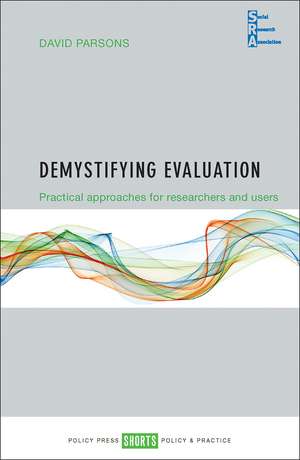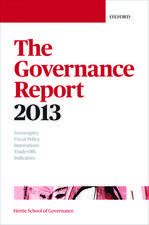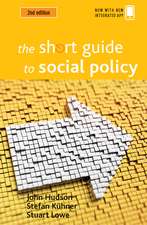Demystifying Evaluation: Practical Approaches for Researchers and Users: Social Research Association Shorts
Autor David Parsonsen Limba Engleză Paperback – 21 feb 2017
If a social service agency is going to be effective, it has to be evaluated regularly to determine whether it is meeting its goals and actually delivering the services it intends to. To do so well, however, requires skilled evaluators and an understanding within agencies of what their role entails. This brief introductory guidebook aims to demystify the work of evaluation, from basic concepts and approaches to choices of methods and implementation. Combining theoretical and practical aspects, it will be of use at all stages of considering, commissioning, conducting, and critiquing evaluations.
Preț: 159.46 lei
Nou
Puncte Express: 239
Preț estimativ în valută:
30.51€ • 31.86$ • 25.25£
30.51€ • 31.86$ • 25.25£
Carte disponibilă
Livrare economică 15-29 martie
Preluare comenzi: 021 569.72.76
Specificații
ISBN-13: 9781447333906
ISBN-10: 144733390X
Pagini: 152
Dimensiuni: 127 x 197 x 15 mm
Greutate: 0.23 kg
Editura: Bristol University Press
Colecția Policy Press
Seria Social Research Association Shorts
ISBN-10: 144733390X
Pagini: 152
Dimensiuni: 127 x 197 x 15 mm
Greutate: 0.23 kg
Editura: Bristol University Press
Colecția Policy Press
Seria Social Research Association Shorts
Notă biografică
David Parsons is visiting professor at Leeds Beckett University and a principal consultant at P&A Research and Consulting. He is also a program evaluator with over thirty years of experience in independent public policy analysis in the United Kingdom, Europe, and internationally.
Recenzii
"This book gets to the heart of the practical and methodological issues evaluators face. An excellent resource for social researchers and commissioners alike."
"Evaluating the effects of spending public money is crucial, but in many policy areas it is easier said than done. Parsons draws on his considerable experience in this very accessible introductory guide which will be of interest to both evaluators and policy leads alike."


















